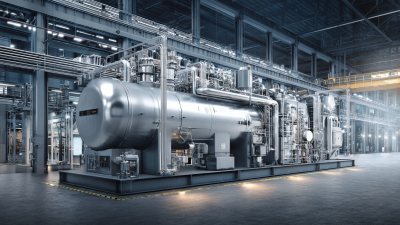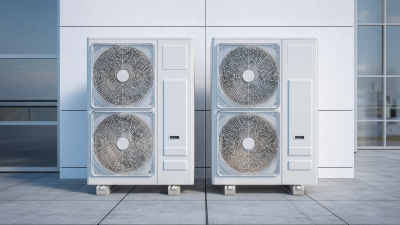Leave Your Message
In an era where sustainable energy solutions are becoming more crucial, the All In One Water Solar Heater emerges as a compelling option for homeowners seeking efficient and eco-friendly water heating alternatives. With the recent advancements in solar technology, these systems not only promise significant cost savings but also feature designs that cater to varied household needs. This blog will provide a comprehensive comparison of the top All In One Water Solar Heaters available on the market, focusing on their efficiency, costs, and unique features. Whether you're aiming to reduce your carbon footprint or simply cut down on energy bills, understanding the differences among these solar heaters can empower you to make an informed decision that best suits your lifestyle and budget. Join us as we explore the most effective units today, so you can harness the power of the sun for your hot water needs.

 When selecting an all-in-one water solar heater, it's essential to consider several key factors that influence both efficiency and cost. First, examine the system's design and technology. Look for models that utilize high-efficiency solar collectors, as these can capture and convert sunlight more effectively. Pay attention to the type of collector—flat plate or evacuated tube—as each has its pros and cons in terms of energy absorption and durability.
When selecting an all-in-one water solar heater, it's essential to consider several key factors that influence both efficiency and cost. First, examine the system's design and technology. Look for models that utilize high-efficiency solar collectors, as these can capture and convert sunlight more effectively. Pay attention to the type of collector—flat plate or evacuated tube—as each has its pros and cons in terms of energy absorption and durability.
Next, assess the size and capacity of the unit. Ensure that the solar heater can meet your household's hot water needs throughout the year. An adequately sized system not only enhances efficiency but also reduces wastage of energy and resources. Additionally, consider the materials used in construction, as stainless steel or high-grade polymers can increase the longevity and reliability of the system, thus providing you with better long-term savings. Lastly, evaluate the warranty and customer support offered by the manufacturer, as these factors can greatly impact your overall satisfaction and peace of mind with the purchase.
When selecting the right solar water heater, understanding efficiency ratings is crucial. According to the U.S. Department of Energy, solar water heaters can achieve efficiency ratings of up to 90%, making them a highly effective option for homeowners looking to reduce energy consumption. The efficiency of these systems is largely determined by factors such as geographical location, quality of the solar panels, and the installation angle. A report by the Solar Energy Industries Association (SEIA) indicates that systems installed in sunnier regions can yield significant savings, enhancing their overall return on investment.
Tip: When comparing solar water heaters, consider checking the Solar Rating and Certification Corporation (SRCC) for efficiency ratings. This will help you assess how well a particular model performs relative to others on the market.
Additionally, it’s essential to factor in the total costs associated with installation and maintenance. A study from the National Renewable Energy Laboratory (NREL) notes that while initial costs may be higher for high-efficiency models, they often result in lower utility bills over time. Investing in a model with better efficiency ratings can pay for itself within a few years, especially if paired with energy-efficient technology in your home.
Tip: Look for models with a warranty period of at least 10 years, as this can be a good indicator of reliability and durability.
| Model | Efficiency Rating (%) | Cost ($) | Storage Capacity (Liters) | Warranty Period (Years) |
|---|---|---|---|---|
| Model A | 85% | 1200 | 200 | 5 |
| Model B | 90% | 1400 | 250 | 7 |
| Model C | 82% | 1000 | 150 | 3 |
| Model D | 88% | 1300 | 220 | 6 |
| Model E | 95% | 1500 | 300 | 8 |
 When considering the initial investment for an all-in-one water solar heater,
upfront costs can vary significantly depending on the model and installation requirements. According to a recent report
by the U.S. Department of Energy, residential solar water heating systems can
range from $3,000 to $8,000. This investment typically covers not only the system
itself but also installation, which is vital for ensuring maximum efficiency. However, while the initial expenditure may
seem daunting, it's essential to factor in the long-term savings that come with
solar heating systems.
When considering the initial investment for an all-in-one water solar heater,
upfront costs can vary significantly depending on the model and installation requirements. According to a recent report
by the U.S. Department of Energy, residential solar water heating systems can
range from $3,000 to $8,000. This investment typically covers not only the system
itself but also installation, which is vital for ensuring maximum efficiency. However, while the initial expenditure may
seem daunting, it's essential to factor in the long-term savings that come with
solar heating systems.
Over time, homeowners can expect substantial reductions in energy bills, often recouping the initial investment within
5 to 10 years. The U.S. Energy Information Administration
notes that solar water heaters can reduce water heating costs by about 50% to 80%,
depending on the system and local climate conditions. In some regions, homeowners may even qualify for federal tax
credits or local rebates, further alleviating the cost burden and enhancing long-term savings.
Tip: Research local incentives and tax credits when
considering a solar water heating system, as these can significantly impact your cost breakdown. Additionally, consulting
with a qualified installer will help ensure you choose a model suited to your specific climate and household needs,
maximizing both efficiency and savings over its lifespan.
When selecting the ideal all-in-one water solar heater, features like durability, maintenance, and usability are critical to ensure long-term satisfaction and performance. According to a report by the Solar Energy Industries Association (SEIA), systems made from high-grade materials can greatly enhance durability, with many well-constructed models lasting over 20 years with minimal degradation in performance. For instance, solar water heaters constructed with tempered glass and corrosion-resistant metal frames demonstrate superior resilience against environmental factors, which is essential for homeowners aiming to maximize their investment.
Maintenance is another vital aspect to consider; systems that are easier to maintain can significantly reduce long-term costs. A study from the National Renewable Energy Laboratory (NREL) indicates that models requiring less frequent and simpler maintenance can save homeowners approximately 15-30% over their lifespan, especially when it comes to part replacements and system checks. Opting for user-friendly designs that may include self-cleaning features or easy-access panels can further enhance usability, allowing homeowners to optimize their systems with minimal effort and enhancing their overall user experience.
When selecting an all-in-one water solar heater, it's crucial to consider the best-selling models on the market and their unique selling points. According to a report by the Solar Energy Industries Association (SEIA), the popularity of solar water heaters is rising, with a market growth rate of approximately 20% annually. The top models typically boast high-efficiency ratings of up to 90%, which signifies their capability to convert sunlight into usable energy efficiently.
One standout model is the SunBank 40 Gallon Solar Water Heater, which features an integrated temperature control system for optimal performance. Another noteworthy option is the Fafco Solar Bear Pool Heater, renowned for its lightweight design and easy installation. These models not only leverage advanced technology for energy savings but also often come with warranties upwards of 10 years, ensuring long-term reliability.
**Tips:** When choosing a solar heater, consider the size of your household and the typical hot water usage to ensure you select a model that meets your needs. Additionally, look for models with high customer ratings and verified efficiency reports; this will help you make a more informed decision. Lastly, always check for regional incentives or rebates that you may qualify for when purchasing a solar water heater, which can significantly offset initial costs.






